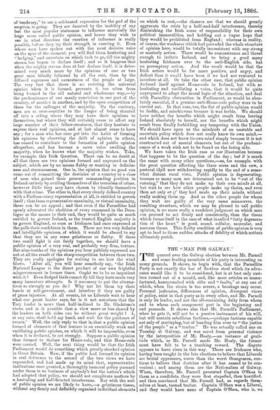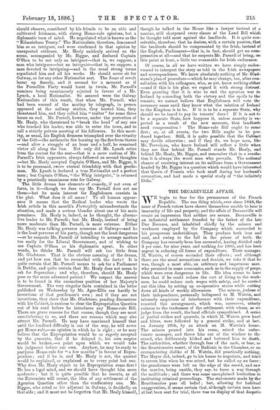THE " MAN FOR GALWAY."
THE quarrel over the Galway election between Mr. Parnell and some leading members of his party is interesting on many grounds. It shows, to begin with, that the Parnellite Party is not exactly the bar of flawless steel which its advo- cates would like it to be considered, but is at best only cast- iron turned out of a mould, and, like most articles so manu- factured, honeycombed with rifts and " faults," at any one of which, when the strain is too severe, a breakage may occur. Personal jealousies, differences of opinion, divergent views of policy, exist in that party as in every other, and Mr. Parnell is only its leader, and not the all-containing deity from whom and to whom each component part in the beginning and end proceeds. It shows also that Mr. Parnell's Parliament, when he gets it, will not be a passive instrument of his will, but will contain rebellious factions,—perhaps factions capable not only of mutinying, but of handing him over to " the justice of the people " as a " traitor." He was actually called one on Tuesday at Galway, and was saved from personal violence by the interposition of Mr. Healy,—an instance of grati- tude which, as Mr. Parnell made Mr. Healy, the former must have felt to be a touching reward. The dispute appears to have risen in this way. There are Irishmen who, having been taught in the late elections to believe that Liberals are brutal oppressors, worse than the worst Orangemen, con- tinue to believe that doctrine after it has ceased to be con- venient ; and among them are the Nationalists of Galway. When, therefore, Mr. Parnell presented Captain O'Shea to them as a candidate, they were first stupefied, then horrified, and then convinced that Mr. Parnell had, as regards them- selves at least, turned traitor. Captain O'Shea was a Liberal, and they would have none of Captain O'Shea, who is, we
should observe, considered by his friends to be an able and cultivated Irishman, with strong Home-role opinions, but a diplomatic turn of mind. He negotiated what is known as the " Kilmainham Treaty." The Nationalists, therefore, denounced him as an intriguer, and were confirmed in that opinion by unexpected evidence. Mr. Healy suddenly arrived on the scene, accompanied by Mr. Biggar, and declared Captain O'Shea to be not only an intriguer—that is, we suppose, a man who intrigues—but an intriguist—that is, we suppose, a man devoted to intriguing—and in the usual strong terms repudiated him and all his works. He should never sit for Galway, or for any other Nationalist seat. The flame of revolt burnt up fiercely, and it seemed for a moment as if the Parnellite Party would burst in twain, Mr. Parnell's nominee being unanimously rejected in favour of a Mr. Lynch, a local Nationalist. So assured were the Galway Nationalists of this result, that when Mr. Parnell, who had been warned of the mutiny by telegraph, in person appeared at the railway station, they hooted him, they threatened him, and they called him " traitor" for some three hours on end. Mr. Parnell, however, under the protection of Mr. Healy, who threatened to " break the head " of any one who touched his leader, was able to enter the town, and to call a strictly private meeting of his followers. In this meet- ing, as usual, his English firmness triumphed over the vivacity of the Celt—the anthracite fire burning up the fire from thorns —and after a struggle of an hour and a half, he remained victor all along the line. Not only did Mr. Lynch retire from the contest for the seat—that is a mere custom of Mr. Parnell's Irish opponents, always followed on second thoughts —but Mr. Healy accepted Captain O'Shea, and Mr. Biggar, it is to be presumed, swore eternal friendship with that gentle- man. Mr. Lynch is declared a true Nationalist and a perfect man ; but Captain O'Shea, " the Whig intriguist," is returned by a practically unanimous vote for Galway.
The little drama has elements of comedy, if not even of farce, in it—though we dare say Mr. Parnell does not see them—but its main interest for Englishmen consists in the plot. What does it all mean ? To all human appear- ance it means that the Radical leader who wrote the Irish article in this month's Fortnightly misunderstands the situation, and made a serious blunder about one of his main premisses. Mr. Healy is, indeed, as he thought, the alterna- tive leader to Mr. Parnell ; but Mr. Healy, instead of being more moderate than Mr. Parnell, is more extreme. Either Mr. Healy was talking perverse nonsense at Galway—and he is the least perverse of his party, though not the least dangerous —or he suspects Mr. Parnell of intending to arrange matters too easily for the Liberal Government, and of wishing to use Captain O'Shea as his diplomatic agent. In other words, he thinks Mr. Parnell will ask too little from Mr. Gladstone. That is the obvious meaning of the drama, and yet how can that be reconciled with the facts? It is quite certain that Mr. Parnell means to ask for a Parliament in Dublin, and quite certain that Mr. Healy does not mean to ask for Separation ; and why, therefore, should Mr. Healy pose as the more advanced patriot ? We suspect the answer is to be found in the anomalous position of her Majesty's Government. The very singular facts contained in the letter published on Wednesday by Mr. Agar-Ellis can hardly be inventions of that gentleman's own ; and if they are not inventions, they show that Mr. Gladstone, pending discussions with his Cabinet, is anxious to clear the Expropriation Question out of his road before he introduces any Home-rule Bill. There are grave reasons for that course, though they are most unsatisfactory to us, and there are reasons which may also attract Mr. Parnell. He may have convinced himself that until the landlord difficulty is out of the way, he will never get Home-rule,—an opinion in which he is right ; or he may believe that the Expropriation would be so eagerly accepted by the peasants, that if he delayed it, his own sceptre would be broken,—a point upon which we would take his judgment before our own. Anyhow, he may be ready to postpone Home-rule for "a few months" in favour of Expro- priation ; and if he is, and Mr. Healy is not, the quarrel would be explained, or explained as to every point but one. 'Why does Mr. Healy object to let Expropriation come first? He has a legal mind, and we should have thought him more moderate ; but it is quite possible that he resents, as all the 'Extremists will resent, the idea of any settlement of the Agrarian Question other than the confiscatory one. Mr. Biggar, who acted as his adjutant in Galway, is decidedly on that side ; and it must not be forgotten that Mr. Healy himself, though he talked in the House like a lawyer instead of a maniac, still sharpened every clause of the Land Bill which he thought told most against the landlords. It is quite con- ceivable, therefore, that he desires, with a certain passion, that the landlords should be compensated by the Irish, instead of the English, Parliament—that is, in fact, should get no com- pensation at all—and that he suspects Mr. Parnell of being, ,ran this point at least, a little too reasonable for Irish endurance.
Of course, in all we have written we have simply endea- voured to interpret the story as told in the Irish newspapers and correspondence. We know absolutely nothing of Mr. Glad- stone's plan of procedure—which he may change, too, after-con- sultation with his colleagues, who, as yet, know nothing either —and if this is his plan, we regard it with strong distrust. Even granting that it is wise to end the agrarian war in Ireland by conceding both the victory and the spoils to the tenants, we cannot believe that Englishmen will vote the necessary sums until they know what the relation of Ireland to the Kingdom is to be. If it is to be a separate State, Why should we be taxed to pay its tenants' dues It it is not to be a separate State, how happens it, unless anarchy is en- pected as a result of the new measure, that landlords need compensation ? The Home-rule Bill ought to come first ; or, at all events, the two Bills ought to be pro- duced together. Still, it is quite possible that the Cabinet may decide otherwise ; and if they do, we hope men, like Mr. Trevelyan, who know Ireland will reflect a little when they see that behind Mr. Parnell stands Mr. Healy, and behind Mr. Healy, Mr. Biggar, and remember that in a revolu- tion it is always the worst man who prevails. The national chance of receiving interest on its millions from a Government headed by Mr. Biggar is a question which would have interested that Queen of Prussia who took snuff during her husband's coronation, and had made a special study of " the infinitely little."



































 Previous page
Previous page